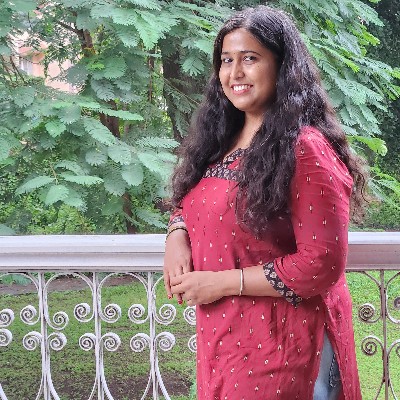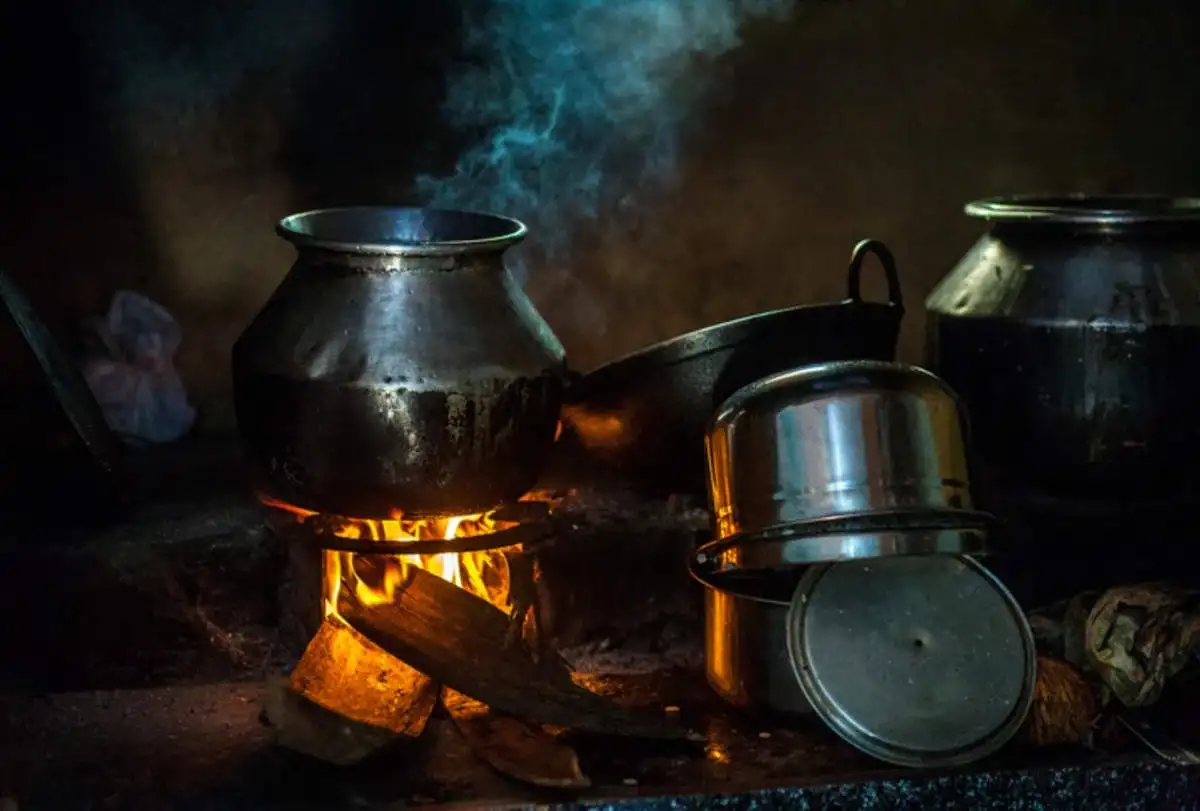The smoke from the roof of the house got mixed with the atmospheric fog, which formed a thick, cloud-like formation when I opened the door of the room we were sleeping in. It was 5.30, and the day had begun for the women there. I had got up early to do some stargazing as there was no air pollution and less light pollution at that time. If you open the kitchen door, you will find a smoky chaos. It feels like even the vessels have life and are working on their own. On the induction stove, water was kept for boiling; there was one vegetable and one curry on both burners of the gas stove; rice was kept for cooking on the firewood stove, which takes about an hour to cook as matta rice takes time to cook. Sheela mami appears to be shifting places in seconds. One moment she is near the gas, and in a flick of a second she will be taking something from the fridge. Her friends from work would begrudgingly say, “You are fortunate. Your husband helps you in the morning. We have to do everything alone and come to work”.
Maman keeps the rice to cook and then goes on to fend the hens, ducks, and birds. Sheela mami is quite fond of her husband. She appreciates him for small things like, “He does not even mind that I am taller than him.” She laughs at his unfunny jokes too. Every morning, as they work together, she fills him with all the gossip. He does not necessarily look at her. He will continue with whatever work he is doing or scrolling on his phone, pretending to be not so interested but attentive enough for her to go on.
— — — — — — — — —
Sheela Mami’s mother Kamala wakes early in the morning, does her bathroom rituals, and sits on a chair near the TV. She sits there most of the day. Her hands and legs hurt all the time, and she had trouble lifting her leg; hence, Sheela mami had brought her to her place to take care of her. Kamala ammuma’s (grandmother) husband remained at home because he needed to work on the plantation. Everyone warned me that if I sat with her and started listening to her stories, she would not stop. I said I did not mind and that I like to listen. I found out that it was true that she was unstoppable, but her stories were interesting. She had a tough life and still continued doing so. She is soft spoken and has a cute toothless smile.
“I get anxious thinking about your appupan (grandfather)” she said, like she was continuing a part of a story that she never started. At first I was confused about her concern for my dead grandfather, but I later realised that she was referring to her husband. She cannot take his name as per the societal rule book. I asked her if she missed him and if he loved her. She shrugged and looked at me like I had asked her something that was not possible. If I presumed her thoughts, it would be like, “Are you kidding? Why would he love me? Do you think this is a movie” But she said, “Your appuppan does not know how to cook, and he will be hungry.”
She said she could never share with him if she was unwell or distressed. She did not want to trouble him. Both of them continued to do their work, one on the plantation and the other in the house. They had three girls. She was quite boastful of her girls. “Smart girls they were,” she said. “When hecklers confronted them, they would have a piece of their mouth. Sheela once slapped a guy who troubled her. Since then, nobody has troubled them. Everybody had such a good impression of my girls. Your appuppan tried to stop them from studying, but I fought against everyone and made my girls study, at least until the tenth standard.”
She had property from her mother’s side, and her brothers were keen on keeping it for themselves. She fought reluctantly against her brother and told them, “I do not want anything; just write it in my girls’ names.” She had trouble sleeping at Sheela mami’s place as she was anxious. When she sleeps, she feels like she is at home with her husband. She dreams of tending to her work there. When she wakes up, she has trouble understanding where she is; eventually, she realises it is not her home.
She has twin brothers, both married to the same woman. I asked if they both fell in love with the same one. She said, “No, no, it was arranged, and the elder of the twins had gone to see the girl. The elder brother tied the taali, but both brothers were present in the photos. Her family did not know this and were enraged, but the woman knew. She liked them both. She consentingly married both brothers. They had one kid.” I inquired as to which brother’s child it was. She answered, “Nobody knows that; we never asked.”
Apparently, this woman was distressed after the marriage of their daughter. She has mental health issues, which nobody addressed at that time. She tried committing suicide twice. Unfortunately, the second one was successful. In the first attempt, she cut her wrist. Her husbands nursed her well after that, and one of them was always with her. One day, when the elder brother went out and the younger one just stepped out for milk, she jumped in the well and drowned. When the younger husband returned and realised what had happened, he jumped into the well to save her. It was too late. Well, that might have calmed the voices in her head.
— — — — — — — — —
Radha amma has trouble putting her slippers on. Her diabetes has made her feet numb, and she does not realise when the slippers come off if she has to travel by bike. Her grandkids suggested that she buy a sandal that has a belt at the back so that her feet can be enclosed with the belt. She has those now, but she puts them on with difficulty. She was widowed at a young age. Her alcoholic husband died of alcohol poisoning. She grieved for that husband, who used to drink every day with her hard-earned money and beat her after coming home every night. She never married again. She stayed a widow for the sake of society and her kids.
A man, a friend of her late husband, once asked for her hand in marriage. She had a wood chopper in her hand for collecting branches and logs of wood for cooking purposes. She held it high in his face and told him, “Never approach me with this request again. My husband’s death does not give permission to any of you to be with me. Get lost from my sight.”
She brought up her kids alone. She did have help from her brothers and sisters. She is a typical village woman, full of gossip and old beliefs that stereotype women and glorify men.She once found a guy for me to marry. She told me that the guy is searching for a girl for marriage because his parents are old and need someone to take care of them. I replied that he needs a maid, not a wife.
All our reasoning and logic about how this generation works falls on deaf ears. That was how she was brought up. She is engulfed in a patriarchal mindset. She does make exceptions for her kids, grandkids, and siblings’ kids, as she has a lot of love in her heart. Her love and care for them surpass all her old beliefs. She was there for each and every birth of her siblings’ children. She remembers the date, time, and star sign of all of them as well. She was always there for every one of her siblings when they needed her. She loved their kids as if they were her own. The love that is precious and unadulterated. The kind that is almost lost today.
Now she is old and not as active as she used to be. She cannot run around for others’ help as she used to. That makes her sad. She tells us now, “Earlier I used to fly; now my wings have been chopped off.”





